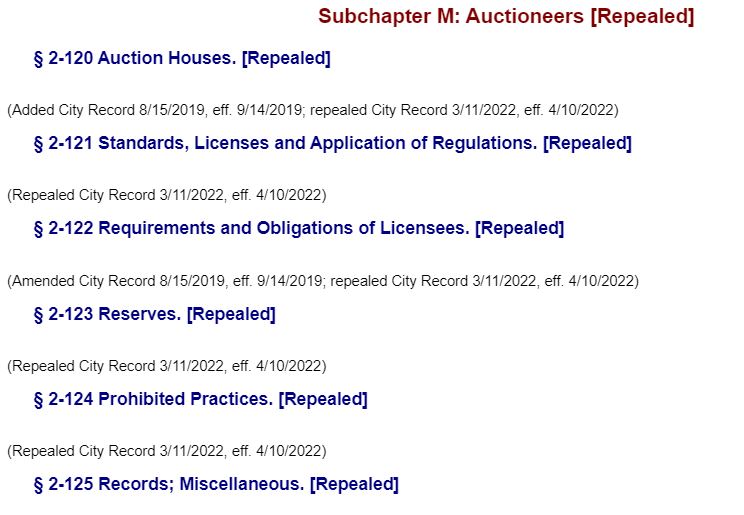The New Wild West – New York City Repeals All Auction Regulations
- by Michael Stillman

Repealed.
New York City has repealed its regulations that applied to book and art auctions. It apparently came as a surprise even to the auction houses. City officials justified the move as streamlining law enforcement and making New York a more desirable place to do business. They cited few complaints since the rules were adopted a couple of decades ago following scandals in the auction world. Not addressed was what role these regulations may have played in reducing complaints or generating confidence in auction buyers.
The need for this repeal is less than obvious. The regulations were designed to create better transparency for buyers and eliminate a few of the most egregious practices. They were not particularly burdensome. The regulations required auction houses and auctioneers to be licensed, which will no longer be the case after June 15. Getting a license can be annoying, but it does provide some assurances to buyers. Many other trades face such requirements. A cosmetologist in New York needs to be licensed to paint your nails or comb your hair but an auctioneer no longer will to sell items costing millions of dollars.
Most notable were regulations on what is known as “chandelier” bidding. This is a practice whereby the auction house places sham bids on an item, creating enthusiasm among bidders who think actual buyers are pushing up the prices. It can lead them to think an item must be more valuable than it is. It got its name from auctioneers pretending they were getting bids from the back of the room while actually looking up (hence at the chandelier). Transparency it is not. New York City's regulations did not prohibit the practice entirely, but prohibited it after the reserve price had been met. However, bidders were not informed what that price was. The justification for the practice is that the auction house needs to start somewhere and no one will get the item if it doesn't at least meet the reserve. Under the now repealed regulations, auction houses could not continue faking bids after the reserve was reached. Now they can.
The old regulations also said that the reserve price could not be higher than the minimum estimate. This was to prevent auction houses from encouraging bidders to think they could buy an item for a price below which the consignor agreed to sell. This protected potential buyers from being enticed to join the bidding by believing they could buy it for such a low price. Once in the bidding and their hopes were aroused, they might continue bidding at a level they would not have otherwise bid. Buyer's regret is lurking.
One other requirement of the repealed old rules was that if an auction house decided to cancel the sale of an item after the auction was completed, they had to notify the winning bidder within seven days.
Will this change the practices employed by New York auction houses? Hopefully not. At least one New York auction said they will continue to follow the old rules. However, it is unclear whether it will change bidders' attitudes. New York is the premier auction location in America, perhaps the world, and New York's reputation for protecting consumers is a positive for the city. It would be hard to say these rules were extreme. Chandelier bidding below the reserve was still permitted as were hidden reserves. Those practices can be misleading. At a minimum, they give the auction house an information advantage. An efficient market is defined as one where all parties have complete and equal access to all relevant information. This change does not help promote market efficiency.